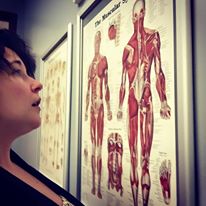Kirsten Schultz can tell you the exact day she first started experiencing symptoms of Systemic Juvenile Idiopathic Arthritis (or SJIA for short).
“It was November 14th, 1993,” she says matter-of-factly, “that’s when it became very apparent to my family. I remember being exhausted,” she continues, “I just wanted to snuggle and nap and watch Scooby-Doo. That’s a big memory.”
November 14th, 1993 may be the date Kirsten and her family first started to deal with symptoms related to SJIA, but her story doesn’t begin and end there. In fact, after her initial diagnosis, Kirsten received more bad news in the form of additional diagnoses including: fibromyalgia, psoriasis, post-traumatic stress disorder and more. These problems can be hard to live with but most of them can be managed. This can be in a range of ways to help from day to night so that the effects can be lessened to live a more functional life. For example, finding it hard to sleep is a serious problem that can lead to more pain and irritability, so making the bed and bedding the most comfortable and supportive it can be is essential, with an article such as ‘How to choose a mattress for fibromyalgia‘ available for reading on websites like winstonsbeds.com, this can help families prepare.
“Doctors gave me 6 weeks to live…..”
Kirsten’s family first noticed her symptoms because their once energetic and fidgety girl became lethargic with pain and discomfort that she couldn’t quite vocalize or describe. She also began to experience a salmon-pink itchy rash at night.



“Before they found a diagnosis they were grasping at straws,” she explains.
There are several types of juvenile arthritis, but all involve a similar set of symptoms including long-term joint inflammation (in one or many joints), fever, rash and/or inflammation in the eyes. JIA was not as well-known in the ’90s as it is today so desperate doctors arrived at the wrong conclusion. They suspected Leukemia.
It was from that point on that Kirsten and her family began to visit doctor after doctor, specialist after specialist, and started weekly blood draws. Kirsten’s mother also got very meticulous with note-taking and conducted her own study of Kirsten’s symptoms (a habit which Kirsten still continues to this day). She did this because the rash eluded doctors.
“It would appear at night and vanish the next day at the doctor’s office,” Kirsten explains.
So, they took a lot of photos and even borrowed a video camera to show the doctors what was happening. The itchy rash, joint pain, and general achiness meant Kirsten wasn’t getting enough sleep which is why her personality shifted so noticeably.
She explains, “When you’re a child and you’re sick you don’t realize that you’re going through something that not everyone else goes through. You assume everyone else goes through the same thing and you’re just not handling it as well as everyone.”
“The medication is doing well, but that doesn’t mean I am fixed”
For years Kirsten tried a host of over-the-counter medicines to treat the pain associated with her SJIA, but nothing really made a difference. At that time there were prescription meds on trial, but the daunting list of side effects kept her mother from giving her anything more powerful. Kirsten had to follow this decision until her senior year of college when the worst flare-up of her life occurred.



Swollen, itchy, and in lots of pain, Kirsten realized she had no idea how to navigate physicians, insurance companies, medications or the ins and outs of her illness. That’s when she finally took a big step in advocating for herself. She saw her first Rheumatologist and started trying prescriptions to ease the pain and itching.
It’s been a long road since that first big step. With the help of her doctor, Kirsten has tried a host of medications while diligently tracking symptoms on her homemade excel spreadsheet. She’s finally settled on one that helps with the inflammation.
“The medication is doing well, but that doesn’t mean I am fixed and it doesn’t mean I don’t have bad days. ”
Despite the bad days, Kirsten’s favorite thing about her current prescription is the medication’s patient assistance program. They call and check in with her regularly and make sure she always has enough meds.
“I like the patient assistance program because it makes me feel valued and a lot of patients just don’t have that experience. Sometimes if you’re just having a crappy day and someone calls and says ‘I’ve noticed your meds are almost gone, how are you doing?’ It’s impactful on an emotional level. They are watching out for me and care about how I’m doing.”
“Sharing my story has completely changed my life for the better.”
In addition to advocating for herself in the medical world, Kirsten started writing about her condition. She was inspired by love as so many writers are.
“When I started writing my blog it was for my husband. It was my way to tell him all the medical stuff and to learn more about it myself.”
At that time she was a sophomore in college and didn’t have much knowledge or education about her condition.
“I needed to have a better grasp,” she asserts.



And Kirsten hasn’t looked back since. To date she has been featured on numerous publications including BlogHer, Everyday Health, and more. Plus, she regularly works with Creaky Joints, Joint Decisions, and the Arthritis Foundation, among others.
“Over the last 7 years I’ve tried to share my story in a unique and real way. If I’m having a bad day I’m probably not going to write the nicest things. It helps me get out a lot of the emotion and process the things I’ve gone through. Plus it helps other people. It’s been what I’ve wanted to do with my life.”
Kirsten is also hoping to pour her passion for healthy and safe sexuality into a brand new project called Chronic Sex.
“In the last 6 years there has been a lot of conversation among patient leaders about this. People are iffy about writing about sex. But I would like to discuss the stuff that physicians don’t see or hear about. How chronic illness affects our romantic relationships and the relationships we have with ourselves,” she explains.
[tweet_box design=”default”]Kirsten Schultz can tell you the exact day she first started experiencing symptoms of #JIA, but her story doesn’t end there.[/tweet_box]
Kirsten’s advice for people living with Juvenile Arthritis.
A juvenile arthritis diagnosis can be overwhelming for patients, parents, and caregivers alike. Kirsten has the following tips for those who are newly diagnosed:
- Get educated about the condition. “You have to learn and become your own best advocate. There are things that I have been able to take care of myself, without wasting a trip to the doctor, because of the knowledge and resources I’ve gained over the years. Knowledge about your conditions saves worry, money, time and other things you can’t get back.”
- Speak to other patients, parents, and caregivers. “It’s difficult to get the right diagnosis, treatment, and support and there isn’t a lot of research or information available. Other patients can be a wealth of information.”
- Use the Arthritis Foundation’s resources. “The Arthritis Foundation has a new website for Systemic JA Kids. You can find it at ORG. It has all sorts of great resources and is geared towards parents (which can be frustrating for adults living with JA). I wish this site had been around in the early days of the internet. I couldn’t find anything that wasn’t for old people living with osteoarthritis.”
- Listen to your body. “It’s ok to experiment with generally accepted rules especially if you have multiple illnesses. For example, everyone assumes that heat helps a joint feel better but that’s not the case for everybody. For people with Fibromyalgia it can have a negative effect and for those with Systemic JA heat might trigger a rash. So, you should experiment with hot and cold. If a hot pack doesn’t work, try a cold one. And that is why it is so important to listen to your body and to do what is best for you.”
- Find services that suit your needs. “I like using Pillpack. They’re a pharmacy that sticks all your meds in little pouches organized by time period. So, for example, all your 6:30 meds are in one pouch. You tear it off of the roll and go. It’s nice to focus on other areas of my health and have this one thing off my plate.”
- Don’t forget to have fun. “In my free time, I spend a lot of time gaming on the PS4. It’s really good for hand dexterity.”
- Be patient. “Just because you have symptoms or flare-up doesn’t mean your meds aren’t working. There many explanations for flares.”
- Know you’re not alone. “Talking to other people makes a huge difference. You are not alone”
Have you been affected by arthritis or another health condition? Sign up to share your experiences with Health Stories Project!


Thanks for sharing your advice about having juvenile arthritis!